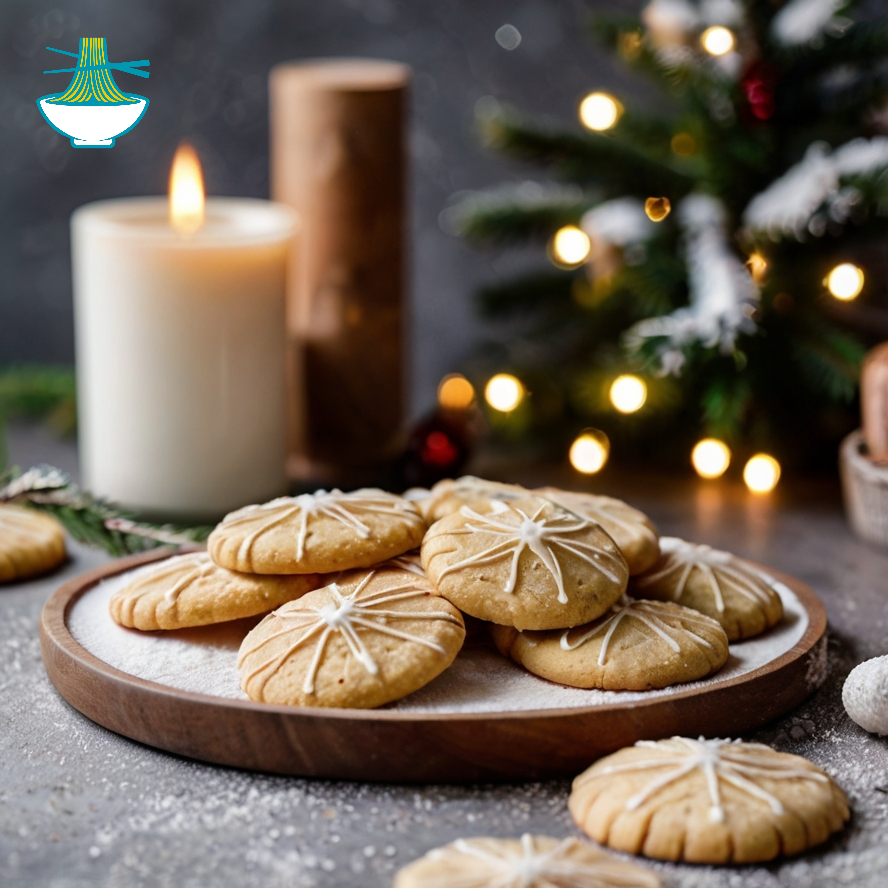Sugar cookies are a classic food treat, perfect for the winter holiday season and an essential part of Merry Christmas celebrations. These soft, sweet cookies are easy to make and can be decorated with icing, sprinkles, or natural alternatives, making them an ideal snack for family gatherings or a special gift. With simple ingredients like flour, butter, sugar, and eggs, this recipe is both delicious and easy to prepare. Whether you're baking for Christmas or getting ready for New Year 2025, these cookies will bring joy and warmth to your festive celebrations. They are a light, comforting treat that pairs wonderfully with hot cocoa or a holiday drink, adding a special touch to your winter holiday moments.
In addition to being a delightful treat, sugar cookies can offer some nutritional benefits when enjoyed in moderation. The butter in the cookies provides vitamin A, which supports immune health and good vision, while the eggs offer protein and iron, essential for muscle repair and energy. Flour provides fiber, promoting healthy digestion. Though they are indulgent, sugar cookies can be part of a balanced diet when prepared thoughtfully. You can even make healthier substitutions like using whole grain flour for added fiber or replacing refined sugar with natural sweeteners like stevia to reduce calories.
However, individuals with certain health conditions should take care when indulging in sugar cookies. People with high blood pressure (hypertension) may want to limit their intake due to the sodium and sugar content, while those with diabetes should be cautious of the high sugar levels, opting for sugar substitutes if needed. Additionally, individuals with high cholesterol should enjoy these cookies in moderation or consider using healthier fat alternatives, such as coconut oil or almond butter. Always consult a healthcare provider if you have concerns about how these cookies might affect your health.
Ingredients:
1. All-purpose flour: 300 grams (can be replaced with 300 grams of oat flour or almond flour for a gluten-free option).
2. Granulated sugar: 200 grams (can be replaced with 150 grams of brown sugar or a sugar substitute like stevia or erythritol for a lower-calorie option).
3. Unsalted butter: 200 grams (can be replaced with 150 grams of coconut oil or 180 grams of almond butter for a healthier alternative).
4. Egg: 1 large egg (can be replaced with 1 tablespoon of ground flaxseeds mixed with 3 tablespoons of water or 1/4 cup of applesauce for a plant-based alternative).
5. Vanilla extract: 1 teaspoon (can be replaced with 1 teaspoon of almond extract for a different flavor).
6. Baking powder: 1 teaspoon (no direct substitute, but baking soda can be used with 1/2 teaspoon of lemon juice or vinegar as an alternative).
7. Salt: 1/4 teaspoon (can be reduced or replaced with sea salt for a slightly different flavor).
8. Sugar for decoration: 2 tablespoons (can be replaced with coconut sugar or natural flowers like cinnamon or nutmeg for a healthier touch).
Preparation Steps:
1. Prepare the dry ingredients:
In a large bowl, combine the all-purpose flour (300 grams), baking powder (1 teaspoon), and salt (1/4 teaspoon). Set aside.
In another bowl, beat the unsalted butter (200 grams) and granulated sugar (200 grams) with an electric mixer until light and creamy.
2. Add the egg and vanilla:
Add the egg (1 large egg) and vanilla extract (1 teaspoon) to the butter-sugar mixture and continue to beat until smooth and fully combined.
3. Combine the dry ingredients:
Gradually add the dry flour mixture into the wet ingredients. Mix until a dough forms, either by hand or with a spoon.
4. Chill the dough:
Divide the dough into two portions and wrap each in plastic wrap. Refrigerate the dough for at least 1 hour (or overnight for best results).
5. Roll the dough:
Once chilled, place the dough on a lightly floured surface (cornstarch works well to prevent sticking). Roll the dough to about 0.5 cm thickness using a rolling pin. Use cookie cutters to shape the dough into Christmas-themed shapes (trees, hearts, etc.).
6. Bake:
Preheat your oven to 180°C (350°F). Place the cut-out cookies on a baking sheet lined with parchment paper. Bake for 8-10 minutes or until the edges are golden.
7. Decorate:
Allow the cookies to cool completely before decorating. You can use royal icing or sprinkle sugar on top (try replacing white sugar with brown sugar or adding natural flavorings like cinnamon).
Tips for Adding Healthy Flavors:
- Spices: For a warm, aromatic flavor, add a pinch of cinnamon or nutmeg to the dough mixture.
- Using tools effectively: Use stainless steel or sturdy plastic cookie cutters to get precise and beautiful cookie shapes. When rolling out the dough, ensure you are using a wooden rolling pin dusted lightly with flour to avoid sticking.
- Healthy Decoration: Instead of using traditional sprinkles, opt for cinnamon, vanilla, or finely chopped nuts as a healthier decorating option. You can also use shredded coconut for a more festive touch.
Healthy Tips:
- To boost fiber content, consider adding 1 teaspoon of chia seeds or ground flaxseeds into the dough.
- For a butter alternative, try using mashed avocado in place of butter for healthy fats.
Enjoy these sugar cookies with a healthier twist this Christmas, and indulge in a delightful treat!
Frequently Asked Questions (FAQ) About Sugar Cookies (Christmas Cookies)
1. Can I make sugar cookies ahead of time and freeze the dough?
Yes, you can absolutely make sugar cookie dough ahead of time and freeze it. After mixing the dough, divide it into portions, wrap each in plastic wrap, and store it in an airtight container or freezer bag. You can freeze the dough for up to 3 months. When ready to bake, simply thaw the dough in the fridge for several hours or overnight, then roll it out and bake as usual. This is a great time-saver, especially during the busy holiday season.
2. How can I make sugar cookies without a rolling pin or cookie cutters?
If you don’t have a rolling pin or cookie cutters, there are creative ways to still make sugar cookies. Use a wine bottle, a jar, or any cylindrical object to roll out the dough. For shaping, simply use a knife to cut the dough into squares, rectangles, or any free-form shapes you like. You can even shape the dough into balls and flatten them with the palm of your hand for a rustic, round cookie.
3. How can I decorate sugar cookies without using traditional icing?
If you're looking for a healthier or simpler way to decorate sugar cookies, try using natural ingredients. For instance, instead of royal icing, use yogurt-based icing or blend powdered sugar with a bit of water or lemon juice for a simple glaze. You can also decorate with shredded coconut, chopped nuts, dried fruit, or even natural sprinkles made from freeze-dried fruit powder. These alternatives add texture and flavor while keeping it healthier.
4. Can I make sugar cookies without eggs, and how will it affect the texture?
Yes, you can make egg-free sugar cookies by using alternatives like flaxseed meal or applesauce. To replace one egg, mix 1 tablespoon of ground flaxseeds with 3 tablespoons of water and let it sit for 5 minutes until it forms a gel-like consistency. This substitute will help bind the dough, but the texture of the cookies might be slightly more delicate and softer compared to the original recipe. Adding a tablespoon of cornstarch to the dough can help achieve a crispier texture if desired.
5. How can I make my sugar cookies crispier or softer?
The texture of sugar cookies can be adjusted by tweaking the baking process and ingredient ratios. For crispier cookies, use slightly less butter, and roll the dough thinner. Bake for an extra minute or two, but keep an eye on the edges to avoid burning. For softer cookies, add a little more butter or replace part of the butter with a mild oil, such as coconut oil. Also, don’t overbake the cookies—taking them out of the oven when the edges are just turning golden will keep them soft and chewy.
Nutrition Value:
1. All-purpose flour (300 grams)
- Calories: 1,095 kcal
- Carbohydrates: 223 grams
- Protein: 30 grams
- Fat: 3 grams
- Sodium: 3 mg
- Cholesterol: 0 mg
- Vitamins: Small amounts of B vitamins like niacin, thiamine, and riboflavin.
- Minerals: Iron, magnesium, and phosphorus
- Nutritional Benefit: Provides complex carbohydrates for energy, fiber for digestion (if whole wheat flour is used), and iron for blood health. Substituting with oat flour or almond flour can provide a gluten-free option, and almond flour adds more healthy fats and protein.
2. Granulated sugar (200 grams)
- Calories: 800 kcal
- Carbohydrates: 200 grams
- Protein: 0 grams
- Fat: 0 grams
- Sodium: 0 mg
- Cholesterol: 0 mg
- Vitamins: None
- Minerals: None
- Nutritional Benefit: Sugar provides a quick source of energy (carbohydrates) but lacks essential nutrients. Replacing it with brown sugar or sugar substitutes like erythritol or stevia can help lower calorie intake, while still satisfying sweet cravings.
3. Unsalted butter (200 grams)
- Calories: 1,430 kcal
- Carbohydrates: 1 gram
- Protein: 1 gram
- Fat: 162 grams
- Sodium: 20 mg
- Cholesterol: 60 mg
- Vitamins: Rich in vitamin A (important for vision and immune health), vitamin E (antioxidant).
- Minerals: Small amounts of calcium and phosphorus
- Nutritional Benefit: Provides healthy fats and vitamin A, which support vision and the immune system. Substituting with coconut oil or almond butter may lower the amount of saturated fat and increase healthy fats.
4. Egg (1 large)
- Calories: 72 kcal
- Carbohydrates: 1 gram
- Protein: 6 grams
- Fat: 5 grams
- Sodium: 71 mg
- Cholesterol: 186 mg
- Vitamins: Vitamin A, vitamin D, vitamin B12
- Minerals: Iron, phosphorus, selenium
- Nutritional Benefit: Eggs provide high-quality protein and are rich in vitamins A, D, and B12, which are important for bone health, immune function, and red blood cell production. A plant-based alternative (such as flaxseeds or applesauce) can be used to reduce cholesterol intake.
5. Vanilla extract (1 teaspoon)
- Calories: 12 kcal
- Carbohydrates: 1.1 grams
- Protein: 0 grams
- Fat: 0 grams
- Sodium: 1 mg
- Cholesterol: 0 mg
- Vitamins: Contains small amounts of B-vitamins
- Minerals: Calcium
- Nutritional Benefit: Provides antioxidants and a pleasing natural flavor. It adds minimal calories, but it can enhance the overall taste of the recipe, encouraging less added sugar for sweetness.
6. Baking powder (1 teaspoon)
- Calories: 5 kcal
- Carbohydrates: 1 gram
- Protein: 0 grams
- Fat: 0 grams
- Sodium: 500 mg
- Cholesterol: 0 mg
- Vitamins: None
- Minerals: Calcium, phosphorus
- Nutritional Benefit: Baking powder helps to leaven baked goods and gives them a fluffy texture, but its nutritional value is minimal. It does add some sodium and calcium in small amounts.
7. Salt (1/4 teaspoon)
- Calories: 0 kcal
- Carbohydrates: 0 grams
- Protein: 0 grams
- Fat: 0 grams
- Sodium: 575 mg
- Cholesterol: 0 mg
- Vitamins: None
- Minerals: Sodium
- Nutritional Benefit: Salt enhances flavor but should be used in moderation to avoid excessive sodium intake. For those with hypertension, sea salt can be used as a healthier alternative.
8. Sugar for decoration (2 tablespoons)
- Calories: 96 kcal
- Carbohydrates: 24 grams
- Protein: 0 grams
- Fat: 0 grams
- Sodium: 0 mg
- Cholesterol: 0 mg
- Vitamins: None
- Minerals: None
- Nutritional Benefit: While sugar adds flavor, it provides no nutritional value and should be used sparingly. For a healthier touch, you can replace it with coconut sugar or natural spices like cinnamon or nutmeg for extra flavor without the added sugar.
By adjusting these ingredients, you can tailor the recipe to your health needs or dietary preferences while still enjoying a delicious holiday treat.


Comments